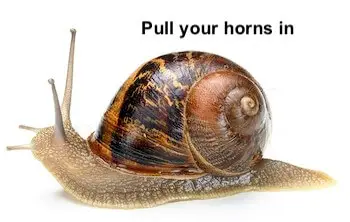Restrain one’s ardour; lower one’s ambitions.
Pull your horns in
What's the meaning of the phrase 'Pull your horns in'?
What's the origin of the phrase 'Pull your horns in'?
with the humble garden snail.
You might think that warning someone who had overreached themselves in some dynamic enterprise to ‘pull their horns in’ was a reference to some pugnacious horned creature, maybe a bull or a rhinoceros. In fact, the creature in question is the unassuming garden snail. The retractable tentacles on which a snail’s eyes are located are known as horns, and these are pulled in whenever the mollusc is threatened.
Likewise, the date of origin of what has the sound of a fairly recent colloquialism, is not what might be expected. Snails were spoken of as ‘pulling their horns in’ as early as the 14th century. An example of that is found in this extract from the Anglo-Norman romantic poem, Richard, Coer De Lyon:
And gunne to drawen in her hornes,
As a snayl among the thornes
That citation uses the common alternative form ‘draw in one’s horns’. Other less common varieties are ‘shrink/pluck in one’s horns’.
An early use of ‘pulling in one’s horns’ as a figurative phrase, with no snails in sight, comes in the 16th century religious diatribe Hay any Work for Cooper, 1589:
Mark how I have made the bishops to pull in their hornes.
[Note: ‘Hay any work for cooper’ was a medieval street cry of the coopering (barrel making/repairing) trade]
The history of “Pull your horns in” in printed materials
Trend of pull your horns in in printed material over time
Related articles
Browse more Phrases
About the Author

Phrases & Meanings
A-Z
A B C D E F G H I J K L M N O P Q R S T UV W XYZ
Categories
American Animals Australian Bible Body Colour Conflict Death Devil Dogs Emotions Euphemism Family Fashion Food French Horses ‘Jack’ Luck Money Military Music Names Nature Nautical Numbers Politics Religion Shakespeare Stupidity Entertainment Weather Women Work
How did we do?
Have you spotted something that needs updated on this page? We review all feedback we receive to ensure that we provide the most accurate and up to date information on phrases.
